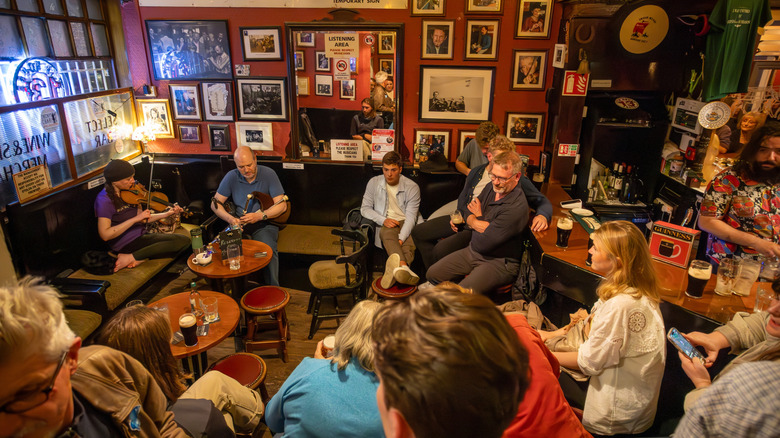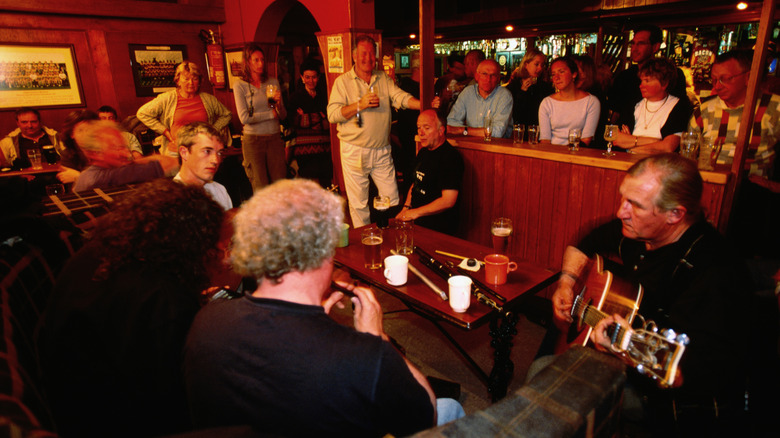Rick Steves Says To Keep An Eye Out For This Fun Event When Visiting Pubs In Ireland
Ireland is, perhaps, the most musical country in Europe. Music is intrinsically linked to the Irish identity. It is cherished, preserved, and loved far beyond the borders of the Emerald Isle. As such, if you are planning to explore Ireland, it is well worth your while to seek out musical events during your trip. And iconic travel writer and television host Rick Steves has some advice on how to do just that.
"Keep your eyes and ears out for a ceilidh (KAY-lee), an evening of music and dance," Steves writes on his website. "When I'm in Ireland, I walk around a pub-filled block like a guy choosing a dance partner, considering where I'll stop to enjoy a pint and a tune." A ceilidh, or ceili, is a tradition that stretches across the Celtic cultures, though it is most commonly associated with Ireland and Scotland. (Technically, ceilidh is the Scottish spelling, while ceili is for Ireland.) It's an evening filled with traditional music and dancing, similar to a barn dance in England or America, and you can find a ceili at concert halls or local town buildings. However, as Steves notes, it's best experienced in a pub.
Anyone should make traditional music (often called simply "trad" by the locals) part of their ideal Irish travel itinerary. It's a source of great pride among the Irish (and so much fun!), and you can easily find ceili and other music festivals across the country, from Temple Bar in Dublin, to far down the incredibly scenic Wild Atlantic Way at the Doolin Folk Festival in County Clare, to Dingle, which Steves says is a great town for live music.
How to experience a ceili in Ireland
Of the Irish pub, Steves writes: "A pub (short for 'public house') is an extended living room where, if you don't mind the stickiness, you can feel the pulse of Ireland." You can feel this pulse quite literally if you seek out pubs with live music. Temple Bar, Dublin's iconic pub-lined neighborhood, will host pub crawls where visitors can experience "sessions" (or sessiuns), which are more improvisational and laid back musical events than ceilis. While music quality may vary, sessions are great fun and can be found nightly at almost any pub in the country.
Ceilis are more structured and the music is intended for dancing – so don't be afraid to try it. The types of instruments you can expect to hear are fiddle, uilleann pipes (Irish bagpipes played seated where the bellows are filled by an arm pump), accordion, guitar, flute, bodhrán (an Irish hand drum), and occasionally, a banjo. Music in Ireland is a nightly occurrence, and usually gets going around 8 or 9 p.m. Be sure to try set dancing too, a style of square dancing that developed in Ireland's pubs. Sets.ie has a comprehensive calendar of dance events you can attend.
The type of music you can expect comes in sets of three tunes or songs. Steves writes: "The wind and string instruments embellish melody lines with lots of tight ornamentation." They vary between fast-paced tunes (jigs or reels) and slower melodies (including waltzes or ballads). Sometimes, music even ceases and a singer comes up to croon a lament. Regardless of what instruments are playing that night, anytime you stop for a ceili or a session in Ireland, you are guaranteed for a fun evening of song, drink, dancing, and great socialization.

